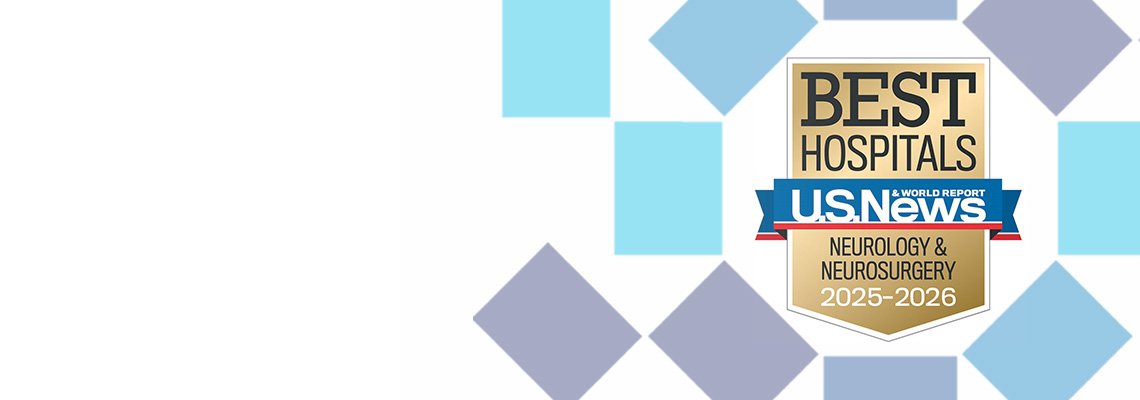Stroke Outcome Data for Public Reporting
Hackensack University Medical Center Public Reporting
Hackensack University Medical Center (HUMC) is a state-recognized and Joint Commission Certified Comprehensive Stroke program, the highest designation available. HUMC also achieved the highest recognition for quality and speed, Get With The Guidelines®‒Stroke Gold Plus Achievement Award with Target: Stroke Honor Roll Elite Plus and Target: Type 2 Diabetes Honor Roll. The award recognizes 85 percent or higher adherence to quality indicators for two or more years, and measures to increase the speed of administering clot-busting thrombolytics.
Our Commitment to Transparency
Hackensack Meridian Health publicly reports stroke data to demonstrate our commitment to quality, accountability, and continuous improvement. These reports highlight:
- Stroke volumes at each Comprehensive Stroke Center
- Treatment rates for clot-busting medication and mechanical thrombectomy
- Surgical outcomes for carotid procedures
- Benchmark comparisons against national averages
Clinical Outcomes
A Stroke Program achieves comprehensive status for its high volume, quality measures, and progressive stroke therapies that are available 24/7. Our stroke volume and outcomes data are publicly reported according to Comprehensive Stroke Center requirements. This data reflects stroke admissions to Hackensack University Medical Center.
HACKENSACK UNIVERSITY MEDICAL CENTER VOLUMES
|
Stroke Types |
2023 |
|
Ischemic Stroke (blood clot in brain) |
703 |
|
Hemorrhagic Stroke (bleeding in brain) |
169 |
|
Ischemic Stroke Treatment Rate |
2023 |
National Average |
|
Thrombolytics (clot busting medication) |
18.7% |
11.8% |
|
Mechanical Thrombectomy (surgical removal of blood clot) |
14.2% |
8% |
Stroke Prevention
Often strokes occur as the result of a blockage in one of the carotid arteries (two main arteries in the neck that supply blood to the brain). In order to prevent a stroke caused by a blocked artery, patients may undergo a procedure to remove the blockage, either carotid artery stenting or carotid endarterectomy. HUMC complication rates are superior to the national benchmark.
|
Surgical Outcomes Rate |
2023 |
Benchmark |
| Meaningful Reperfusion (restoring blood flow to an affected part of the brain) | 96.6% | 87.2% |
|
Carotid complications |
1.8% |
<6% |
JFK University Medical Center Public Reporting
JFK University Medical Center (JFKUMC) is a state-recognized and Joint Commission Certified Comprehensive Stroke program, the highest designation available. JFKUMC also achieved high recognition for quality and speed, Get With The Guidelines®‒Stroke Gold Plus Achievement Award with Target: Stroke Honor Roll and Target: Type 2 Diabetes Honor Roll. The award recognizes 85 percent or higher adherence to quality indicators for two or more years, and measures to increase the speed of administering clot-busting thrombolytics.
Clinical Outcomes
A Stroke Program achieves comprehensive status for its high volume, quality measures, and progressive stroke therapies that are available 24/7. Our stroke volume and outcomes data are publicly reported according to Comprehensive Stroke Center requirements. This data reflects stroke admissions to JFK University Medical Center.
JFK UNIVERSITY MEDICAL CENTER VOLUMES
|
Stroke Types |
2023 |
|
Ischemic Stroke (blood clot in brain) |
605 |
|
Hemorrhagic Stroke (bleeding in brain) |
168 |
|
Ischemic Stroke Treatment Rate |
2023 |
National Average |
|
Thrombolytics (clot busting medication) |
15.2% |
11.8% |
|
Mechanical Thrombectomy (surgical removal of blood clot) |
14.9% |
8% |
Stroke Prevention
Often strokes occur as the result of a blockage in one of the carotid arteries (two main arteries in the neck that supply blood to the brain). In order to prevent a stroke caused by a blocked artery, patients may undergo a procedure to remove the blockage, either carotid artery stenting or carotid endarterectomy. JFKUMC complication rates are superior to the national benchmark.
|
Surgical Outcomes Rate |
2023 |
Benchmark |
| Meaningful Reperfusion (restoring blood flow to an affected part of the brain) | 87.3% | 87.2% |
|
Carotid Complications |
2.2% |
<6% |
Jersey Shore University Medical Center Public Reporting
Jersey Shore University Medical Center (JSUMC) is a state-recognized and Joint Commission Certified Comprehensive Stroke program, the highest designation available. JSUMC also achieved the highest recognition for quality and speed, Get With The Guidelines®‒Stroke Gold Plus Achievement Award with Target: Stroke Honor Roll Elite Plus and Target: Type 2 Diabetes Honor Roll. The award recognizes 85 percent or higher adherence to quality indicators for two or more years, and measures to increase the speed of administering clot-busting thrombolytics.
Clinical Outcomes
A Stroke Program achieves comprehensive status for its high volume, quality measures, and progressive stroke therapies that are available 24/7. Our stroke volume and outcomes data are publicly reported according to Comprehensive Stroke Center requirements. This data reflects stroke admissions to Jersey Shore University Medical Center.
JERSEY SHORE UNIVERSITY MEDICAL CENTER VOLUMES
|
Stroke Types |
2023 |
|
Ischemic Stroke (blood clot in brain) |
618 |
|
Hemorrhagic Stroke (bleeding in brain) |
219 |
|
Ischemic Stroke Treatment Rate |
2023 |
National Average |
|
Thrombolytics (clot busting medication) |
17.7% |
11.8% |
|
Mechanical Thrombectomy (surgical removal of blood clot) |
17.5% |
8% |
Stroke Prevention
Often strokes occur as the result of a blockage in one of the carotid arteries (two main arteries in the neck that supply blood to the brain). In order to prevent a stroke caused by a blocked artery, patients may undergo a procedure to remove the blockage, either carotid artery stenting or carotid endarterectomy. JSUMC complication rates are superior to the national benchmark.
|
Surgical Outcomes Rate |
2023 |
Benchmark |
| Meaningful Reperfusion (restoring blood flow to an affected part of the brain) | 91.1% | 87.2% |
|
Carotid Complications |
2.2% |
<6% |




